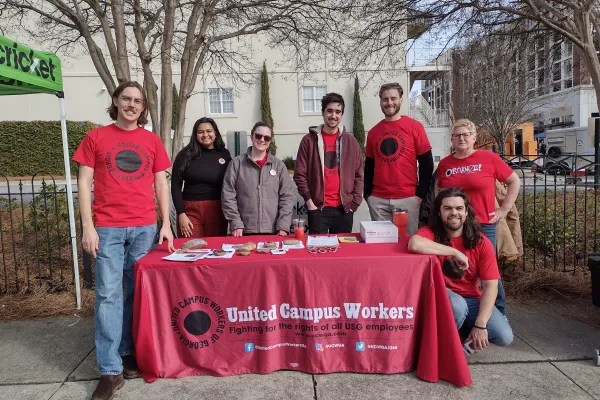Coronavirus on campus: maybe we’ll get lucky........ Or maybe we won’t.
If we’ve learned nothing else this past year, it’s that the virus doesn’t care about our wishes and expectations. Even now, as Americans begin to relax due to the availability of the vaccines in the USA, the global pandemic is far from over. Dangerous and unpredictable new variants keep emerging, and could easily find their way into local communities in the USA. Fortunately, the vaccines seem to be effective against the new strains so far, but there are no guarantees that this won’t change.
As centers of research and learning, Georgia colleges and universities should be taking the lead in educating and protecting the public— beginning with our own campuses. Instead, the opposite is happening: the University System of Georgia has ordered a full return to normal operations, including classroom instruction, this month [June 2021], with a likely continuation in the Fall.
Students, faculty and staff watched in unbelieving dismay when, in the summer of 2020, the USG unveiled their commitment to “safely reopen” campuses. In their letter of July 21, the presidents of 24 of the 26 USG institutions were whipped into line. Yet— with the notable exception of Georgia Tech— the USG never came up with a serious strategy to monitor infection rates on campuses and surrounding communities. Amazingly, the USG never even hinted at a policy about what conditions would be considered unsafe. The result was that campuses were ghost towns in the Fall, as students, faculty and staff chose to protect themselves, their loved ones, and their communities by staying away. We followed the data we could scrounge up, held our classes online, and waited for better news.
This year, the cluelessness of the USG again threatens to undermine their own goals. Now the USG expects us again to trust the wisdom of their gamble and simply return to campus as if nothing had happened. Recent data reveals that only 31% of Georgia adults are fully vaccinated so far. This number will increase by the Fall, but by how much? USG communities have no data on the vaccination rates on our campuses. In the absence of a vaccine requirement— now forbidden by Gov. Kemp— we find ourselves once again needing to guess at the level of risk.
It is still possible to open safely this Fall, but only if the following minimum conditions are met:
1. If a vaccine mandate is off the table, then it is only prudent for the unvaccinated to submit to weekly testing. This policy has been adopted already by Stanford University.
2. Vaccination rates among students, faculty, and staff must be aggregated and reported regularly.
3. Wastewater testing must be expanded throughout the USG.
4. Accommodations for employees and students who are at elevated risk from covid-19 must be extended. Accommodations should be expanded to include USG workers and students who share a household with those at high risk of severe COVID-19.
5. Each USG institution must work with their surrounding community to promote and inform on vaccination and take the lead in vaccinating community members.
Signed by the Executive Board and Officers of UCWGA
UCWGA Endorses the CWA Executive Board's Statement on the War in Gaza
GGC Faculty Vote No Confidence in President Jann Joseph and Provost George Low


